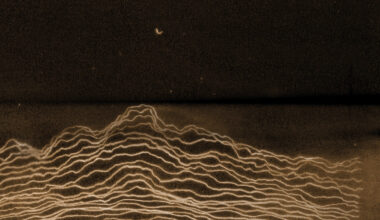What Crisis?

China Crisis are one of those bands who, when mentioned these days, get the mearest flicker of recognition. One of those acts people have heard of, but only just. This reissue of their first three albums with a truckload of extras should straighten that right out.
Formed in Merseyside, Kirky to be precise, by singer/keyboarder Gary Daly and guitarist Eddie Lundon, the problem, if it was a problem, was where to put them. We do like a neat label, but what were China Crisis? Although they operated within the buzzing Liverpool scene in the early 1980s, they weren’t really a Liverpool band. Neither synth heads like OMD nor cool kids Echo And The Bunnymen. Sure, they wrote ruthlessly effective pop songs, major label polished pure pop affairs that sounded pretty good in Hawaii it turns out (more of which later), but there was so much more going on than initially met the ear.
While 1982’s snappily titled ‘Difficult Shapes & Passive Rhythms, Some People Think It’s Fun to Entertain’ features the hit singles ‘Christian’ and ‘African And White’ they’re not even the best two tracks on what is a debut album to be reckoned with. The electro-sounding backing track to ‘When The Piper Calls’ reveals a band who knew an 808 from their elbow. ‘Working With Fire And Steel…’, released just a year later, spawned ‘Wishful Thinking’, their biggest hit. Which is curious. ‘Tragedy And Mystery’ followed it on the album, by far a better song that stalled at number 46 upon its release.
Anyway. Listening to these remastered deluxe editions (which come with rafts of versions, remixes, demos and live bonus sets) it’s hard to fathom why China Crisis didn’t climb the greasy pop pole to the very toppermost, but it’s listening between the lines that’s most revealing. Like the Blancmange set earlier in the summer, these bonus discs are a treat and a half. We spoke to Gary Daly recently (see next issue) and he lifts the lid on the making of his many demos. At the centre of the set up was a Roland double-bill – a Jupiter-8 and a TR-808. Seems he’d write from the bassline up, which explains much. Early doors, he’d record round his mum’s house and had a neat trick of hanging a mic out the window and feeding in sounds from the outside world. A huge fan of Eno’s ambient works it seems.
While the albums are polished to a major label sheen, the demos lay the original ideas bare. When finished versions don’t stray too far from those demos, that’s when you know you’re sitting on pop gold. ‘African And White’ is glorious. Stripped back, a tsk-tsk-tsk snare repeats over and over a fud-fud-fud bassdrum, while the familiar bass riff tinkers around over the top. It’s so dazzlingly simple. ‘Wall Of God’, from their third album ‘Flaunt The Imperfection’ (yes, yes, we’ll get to it in a minute) is as good as pop songs get, and, surprise, the instrumental demo is sublime. The rolling bassline, the twinkling guitar, the tinkling percussion, they used to segue it with Bob Marley’s ‘Exodus’ live. You can imagine, right? The demo for ‘Black Man Ray’, again entirely instrumental, has a backing of chirping birds if you listen carefully. That mic out the window eh? This is why I’ll never be on ‘Desert Island Discs’. You try explain why the birdsong buried in the mix of a demo of a half-hit recorded 30-odd years ago is so life-affirming.
And so to the main attraction. I wasn’t much into ‘Flaunt The Imperfection’, their third album, when it came out in 1985. Seems my ears had died and fallen off. It is, in short, a forgotten classic. Last month we were banging on about Donald Fagen on these very pages, it’s almost like we plan these things because, low and behold, who produced ‘Flaunt…’? The late, great Walter Becker, who it turns out picked up a cassette of ‘Working With Fire And Steel…’ in a record store and gave it a regular outing round Steely Dan Towers. In Hawaii.
When asked if there was anyone he’d like work with, our scally friends were top of his list, much to their obvious amazement.
Such was Becker’s input on ‘Flaunt…’ that he is officially credited as a band member on the sleeve. “Walter Becker” it says, “synthesizer, percussion”. There’s not a duff track in sight. ‘The Highest High’ is a masterclass in opening an album, the milkman whistle of an intro alone is worth a couple of goes before you let the song kick in, while the laidback horns and punchy keys of ‘You Did Cut Me’ could be a lost Steely Dan classic. They talk in the excellent new sleeve notes about how Becker liked to start with the bass and drums, get the rhythm track right, and the rest was just sheen. Some sheen.
So what are China Crisis? A guilty pleasure? Occasional chart botherers? A pop band with deep sides? Best get all three of these beauties chop chop and rediscover this sort of joy for yourself.





